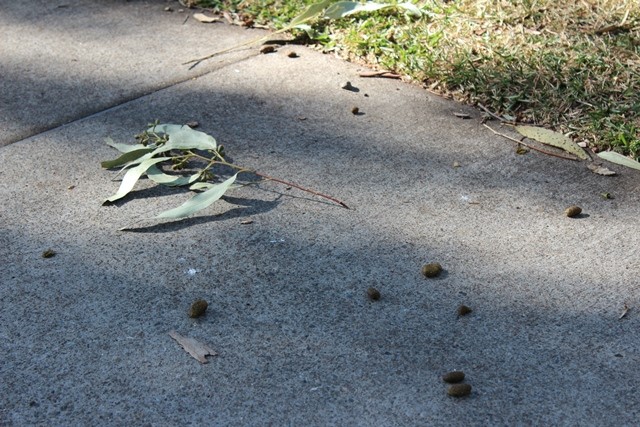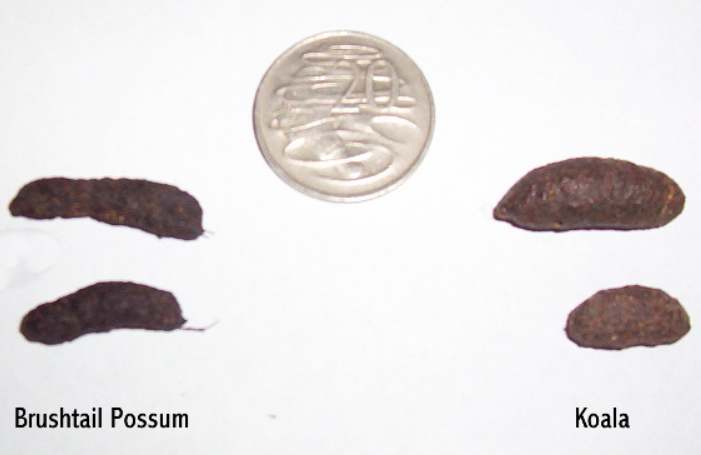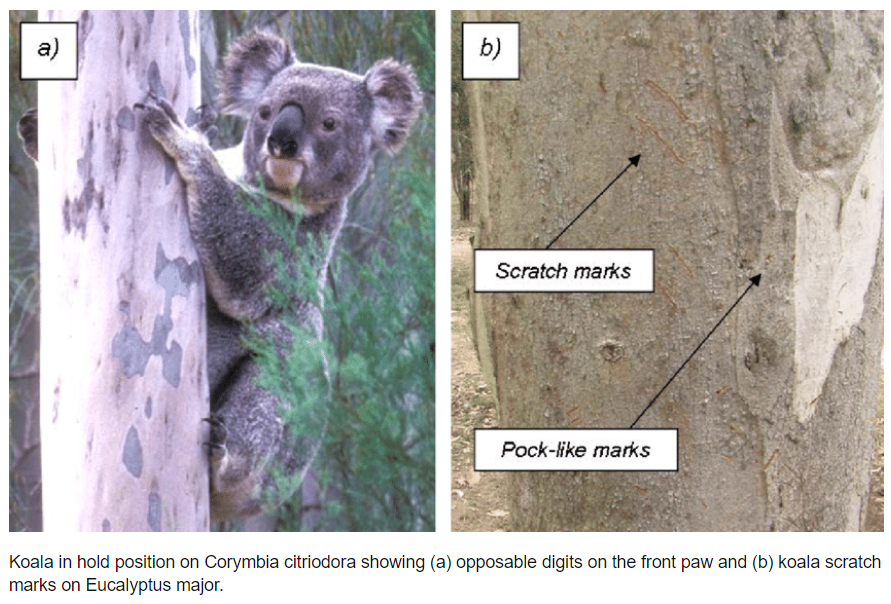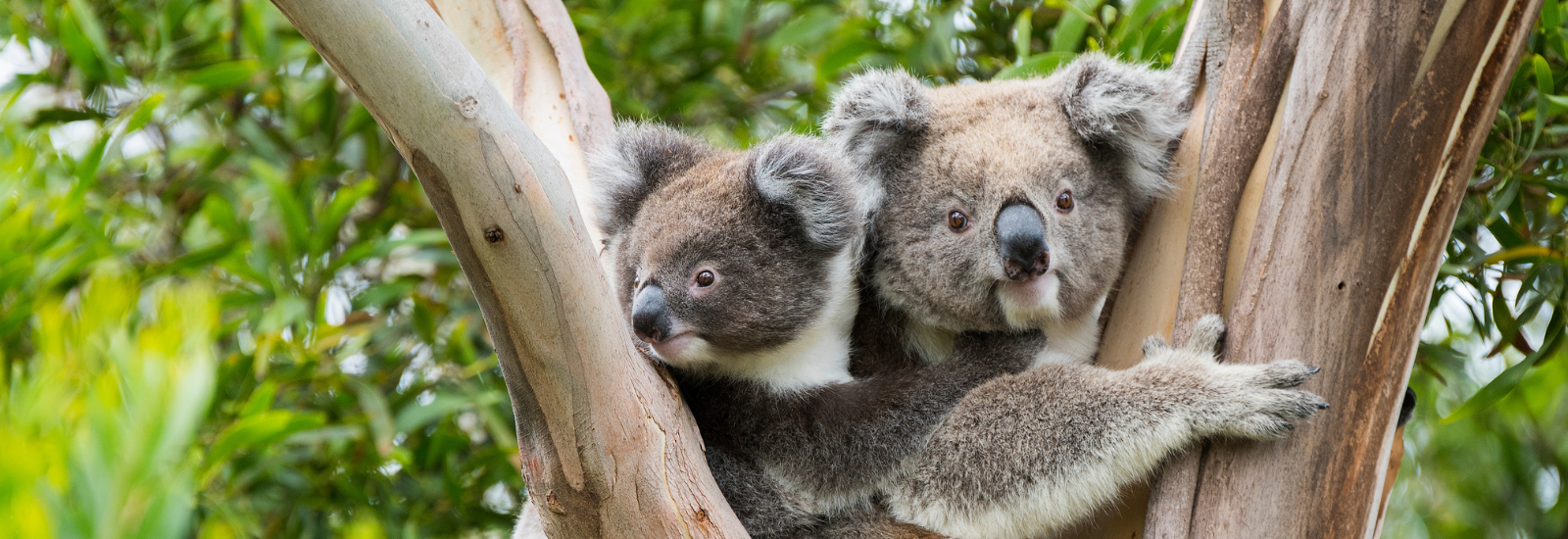Factsheets and FAQs
Factsheets
- Koala facts – Learn more about our furry friends (PDF 689 KB)
- Living with Koalas – How to improve your property for Koalas (PDF 2.3 MB)
- What's that scat? Koala scat identification (PDF 1.7 MB)
- Koala survival kit – Help protect wildlife in the heat (PDF 369 KB)
- Koala Frequently Asked Questions (PDF 3 MB)
FAQs
When Koalas are sick they will often come down to ground level or stay in low tree branches. They may have wet, brown dirty bottoms or crusty weeping red eyes, may be acting really lethargically or sitting on the ground. If you see an unwell or injured Koala please do not approach or touch, keep an eye on the animal and call the Port Stephens Koala Hospital (PSKH) 24hr Koala Rescue Number – 1800 PS KOALAS (1800 775 625).
For more information, view: Recognising a sick Koala and calling for rescue
Cars
Koala road strike is a major threat to Koalas with numerous Koalas killed by cars each year. Did you know that Port Stephens has one of the highest number of Koala road fatalities in NSW? When you’re on the road, please be aware that Koalas are more active between dusk and dawn, particularly during warmer months when Koalas are breeding. If you hit a Koala, call the Port Stephens Koala Hospital (PSKH) 24hr Koala Rescue Number – 1800 PS KOALAS (1800 775 625) - and report it straight away. There may be a joey in the mother’s pouch or in a nearby tree. Do not encourage a Koala that may have been hit by a vehicle to climb up and away from rescuers. Koalas can climb even with fractured bones. Secure it by covering it with a laundry basket, box, towel, jacket, or blanket, and hold it in a safe place until rescuers arrive.
Dogs
Dogs often attack Koalas and a dog bite can be fatal if the wound is not cleaned and antibiotics given to prevent infection. Koalas do not bleed profusely, so the wound may not be obvious. Keep your dog on a lead when you are in a park or the bush and keep them away from gum trees at night. Lock your dogs up at nighttime to reduce the risk of dogs attacking Koalas in your backyard. Dog trainers recommend putting Koala scat in the dogs bedding to normalise the scent of Koalas which may prevent dogs from wanting to chase or bark at them.
If you discover a sick or injured Koala, or are worried about a Koala’s health, get in touch with Port Stephens Koala Hospital (PSKH). PSKH volunteers are available to rescue and protect Koalas at all times of the day or night.
24hr Koala Rescue Number – 1800 PS KOALAS (1800 775 625)
Koalas feed almost exclusively on the leaves of Eucalyptus trees and a small handful of other species. All native vegetation in our LGA, including that in our backyards, contributes to providing connectivity and sheltering habitat for Koalas. In the Port Stephens LGA 15 tree species have been identified as important for Koala feeding:
Preferred Koala Feed Trees:
- Swamp Mahogany (Eucalyptus robusta)
- Forest Red Gum (Eucalyptus tereticornis)
- Parramatta Red Gum (Eucalyptus parramattensis)
- Grey Gum (Eucalyptus canaliculata)
- Tallowood (Eucalyptus microcorys)
- Grey Box (Eucalyptus moluccana)
- Parramatta Red Gum (Eucalyptus parramattensis)
- Small fruited Grey Gum (Eucalyptus propinqua)
- Grey Gum (Eucalyptus punctata)
- White Stringybark (Eucalyptus globoidea)
- Flooded Gum (Eucalyptus grandis)
- Sydney Peppermint (Eucalyptus piperita)
- Narrow-leaved Scribbly Gum (Eucalyptus racemosa)
- Red Mahogany (Eucalyptus resinifera)
- Sydney Blue Gum (Eucalyptus saligna)
- Scribbly Gum (Eucalyptus haemastoma)
More information about locally important Koala trees in Port Stephens can be found here
During the breeding season (August- February) and predominantly during the evening, Koalas can be heard bellowing calls looking to attract a mate. Both female and male Koalas can make bellowing calls, however Males are more commonly heard calling to attract a mate. Koalas produce deep bellowing or grunting calls by using a special sound-producing organ called a descended larynx (which holds the vocal cords). Play the video below to hear what a Koala sounds like.
Koala scat looks a lot like the pips of a large olive in terms of shape and size. Koala scat will have a strong smell of Eucalyptus, even when dry. Koalas produce these little pellets 24 hours a day, even when they’re asleep, and they produce a lot of them – a healthy koala produces 100-250 pellets a day. Be careful not confuse the scats of Koala with the similarly sized and shaped scats of the Brushtail Possum. Possum scats however typically are smaller and have a strong musky odor, which is not exhibited by Koala scat.

Photo credit: Anne Newsome

Photo credit: Paul Alessi
Koalas have very sharp claws with two opposable thumbs on their front feet, and one opposable thumb without a claw on their back feet. This allows them to get a better grip—essential for climbing trees. When climbing, Koalas leave behind characteristic scratches in the bark, which remain visible until the bark is shed each year, allowing you to gauge how frequently Koalas use that particular tree. Rough barked trees that have been regularly climbed by Koalas may also have the outer layer of weathered bark scratched away, exposing the fresh layer beneath. Koalas may leave distinctive scratches on the trees they climb. These scratches are more visible on smooth-barked trees and may look like two lines parallel at an angle above smaller random scratches or pock-like marks.

Image Source: Queensland Herbarium
Adult male Koalas are noticeably larger than adult female Koalas, with longer heads and distinctly larger black noses. Male Koalas also have a large scent gland on their chest which looks like a dark vertical mark down the middle of their upper chest which they rub against trees as they climb to mark their territory. Adult female Koalas have a relatively clean white chest and a backward facing pouch for their young. Their faces are a little flatter and their noses a little smaller.
Did you know the Koala is an umbrella species?
An umbrella or flagship species is a term used in conservation biology to describe a species that requires the same habitat or ecosystem as other species. The concept is based on the idea that by protecting and managing the habitat of an umbrella species, many other species that share the same habitat will also be indirectly protected.
By protecting and conserving the habitats of Koalas, many other species that inhabit the same ecosystems, such as other marsupials, birds, and reptiles, also benefit.
The NSW Koala breeding season generally occurs during summer, between the months of September and February.
During breeding season Koalas are much more active and moving around looking for a mate, meaning they are also at higher risk from threats such as cars and dogs.
Koalas in our LGA face numerous threats, including vehicle strike, predation and dog attack, disease, bushfire and habitat loss. Our population is in a state of decline, so ensuring a healthy and successful breeding season each and every year is critical for their conservation. We can help ensure a safe and successful breeding season by raising awareness and undertaking a few simple actions. Ensure that you are being extra careful when driving through known Koala areas or native bushland during night hours, adhere to speed limits, and be vigilant for wildlife crossing signs. Slowing down and being vigilant can significantly reduce the risk of collisions with Koalas and other wildlife.
Dog attacks are another significant threat to Koalas in our LGA. All recorded dog attacks occur when dogs are off-lead, with majority occurring in backyards. If you live in an area where Koalas may also live, please secure your dogs at night in a fenced area inaccessible to Koalas, or bring them inside. If you see a Koala on your property please secure your dog inside your house, garage, or fenced area until the Koala has left, follow signs/warnings for designated wildlife and on-leash areas, and ensure dogs are kept on leads in public areas where there may be Koalas.
If you come across an injured, sick, or orphaned Koala, please contact Port Stephens Koala Hospital (PSKH) at 1800 PS KOALAS (1800 775 625), or Wildlife In Need of Care (WINC) at 1300 946 295 immediately.
Please do not attempt to handle the Koala yourself, Koalas have large claws and can be dangerous. They can also become easily stressed or injured

